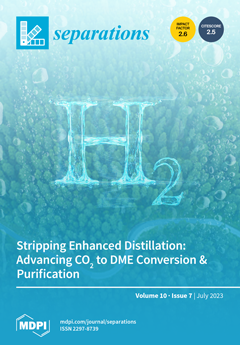Bacterial endophytes reside within the tissues of living plant species without causing any harm or disease to their hosts. Bacterial endophytes have produced a variety of bioactive compounds that can be used for different biomedical applications. In the current study, two bacterial endophytes were isolated from healthy
Moringa oleifera leaves, and identified genetically as
Stenotrophomonas maltophilia and
Alcaligenes faecalis. Phytochemical results illustrated that
A. faecalis produced phenolics at 547.2 mg/g, tannins at 156.7 µg/g, flavonoids at 32.8 µg/g, and alkaloids at 111.2 µg/g compared to
S. maltophilia, which produced phenolics at 299.5 mg/g, tannins at 78.2 µg/g, flavonoids at 12.4 µg/g, and alkaloids at 29.4 µg/g. GC-MS analysis indicated that
A. faecalis extract has 24 bioactive compounds, including 9 major compounds, namely octadecanoic acid, hexadecanoic acid, linoleic acid ethyl ester, octadecenoic acid, methyl ester, methyl stearate, nonacosane, indolizine, palmitoleic acid, and heptacosane. On the other hand,
S. maltophilia extract has 11 bioactive compounds, including 8 major compounds, namely oleic acid, octadecanoic acid, hexadecanoic acid, cis-2-phenyl-1, 3-dioxolane-4-methyl, ergotamine, diisooctyl phthalate, diethyl phthalate, and pentadecanoic acid. To check the safety of these extracts, the cytotoxicity of Ethyl acetate (EA) extracts of
S. maltophilia and
A. faecalis were evaluated against the Vero normal cell line, and the results confirmed that these extracts are safe to use. Moreover, results revealed that EA extracts of
S. maltophilia and
A. faecalis exhibited anticancer activity against the cancerous MCF7 cell line, where IC
50 was 202.4 and 119.7 µg/mL, respectively. Furthermore, EA extracts of
S. maltophilia had antibacterial and antifungal activity against Gram-positive and Gram-negative bacteria, and unicellular fungi. Likewise, the EA extract of
A. faecalis exhibited antibacterial and antifungal activity against Gram-positive bacteria, as well as unicellular fungi, but did not show any activity against Gram-negative bacteria. Also, EA extracts of
S. maltophilia and
A. faecalis exhibited moderate antioxidant activity where IC
50 were 146.2 and 147.6 µg/mL, respectively. In conclusion, the two isolated endophytic bacteria
S. maltophilia and
A. faecalis have promising bioactive compounds that have antibacterial, antioxidant, and anticancer activities.
Full article





